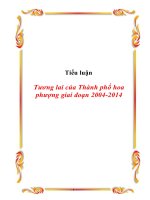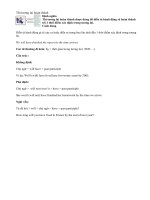Future Perfect - Tương lai Hoàn thành doc
Bạn đang xem bản rút gọn của tài liệu. Xem và tải ngay bản đầy đủ của tài liệu tại đây (50.98 KB, 2 trang )
Future Perfect - Tương lai Hoàn thành
FORM of Future Perfect
The future perfect is composed of two elements: the simple future of the verb to
have (will have) + the past participle (PP) of the main verb:
S + will have + PP
I will have learnt English.
He will have swum well.
They will have watched TV.
S + will have not + PP
I will not have learnt English.
He will not have swum well.
They won't have watched TV.
Will + S + have + PP
Will you have learnt English?
Will he have swum well?
Will they have watched TV tonight?
The future perfect tense expresses an action in the future before another action in
the future. This is similar to the past in the future.
The train will leave the station at 9am. You will arrive at the station at
9.15am. By the time you arrive, the train will have left.
USEs of Future Perfect
1. Completed Action Before an Event in the Future
You can call me at work at 8am. I will have arrived at the office by 8.
They will be tired when they come. They will not have slept for a long
time.
"Mary won't be at home when you arrive."
"Really? Where will she have gone?"
Notice in the examples above that the reference points (marked in italics) are in
Simple Present rather than Simple Future. This is because the interruptions are
in time clauses, and you cannot use future tenses in time clauses.
Forms of Negatives and Questions
Negative sentences and questions are formed with the auxiliary verb 'will'.
I am not going to have finished this test by 3 o'clock.
Will she have learned enough Chinese to communicate before she moves
to Beijing?









